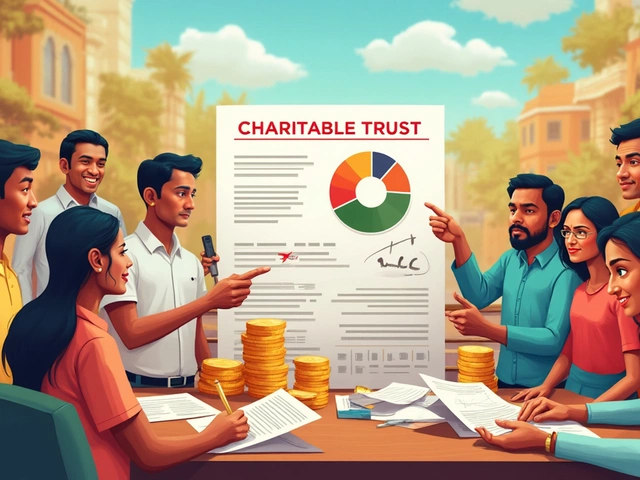Picture this: a teenager in California running a charity to help homeless teens, or a retired mechanic in Manchester raising money for cancer research. The world of charities is packed with unlikely founders. Even kids as young as ten have been legal charity directors. The myth that only the rich, highly educated, or well-connected can start or run a charity is simply wrong. Modern rules are a lot broader—and surprisingly friendly.
Most people think running a charity means you need a pile of money, a law degree, or years in nonprofit work. But here’s the punchline: in places like the US, UK, Australia, and Canada, you don’t even need to be a legal genius, own a tuxedo, or know celebrities. You need passion, some patience (government paperwork is a fact of life), and, in some cases, a criminal background check. That’s about it.
So who can run a charity? Can students create charities? Can someone without formal education be a charity founder? Is it as easy as clicking a button online? Let’s peel away the mystery and get real about who can become the heartbeat behind a nonprofit.
Legal and Practical Requirements: Who's Allowed to Run a Charity?
Wondering if you’ve got what it takes—or if the law will block your way? The good news is, legal hurdles to starting or running a charity are a lot lower than most people expect. In the United States, you don’t need a bachelor’s degree, a certain profession, or a big bank account. What you do need is to be legally competent; most states require founders to be at least 18 years old. Minors can sometimes serve on youth project boards, but for official signatory roles, adults are usually needed. In the UK, there’s no upper age limit, and young people aged 16 and up can serve as trustees of charities set up as charitable companies. Australia and Canada have similar age and competency rules, though they ban people who have been convicted of certain offenses (like fraud) from serving as directors or trustees.
Your background matters more for transparency than for ability. In the UK, you’ll need to state if you’ve been bankrupt or convicted of dishonesty crimes. In the US, if you’re planning to apply for 501(c)(3) status (the IRS’s magic tax-exempt stamp), background checks focus on whether your organization operates with integrity and avoids self-dealing—a fancy term for “don’t give all the money to family or yourself.”
Now, let’s talk size: one person cannot technically be a board, but lots of charities start small, with three to five people as directors or trustees. The law doesn’t mind if your team is your family or friends—what matters is that everyone acts in the charity’s best interests.
Beyond the sticky notes and paperwork, there are practical skills you’ll need. You should be someone who’s okay sending in annual returns, handling simple financial records, and keeping up with email. You don’t need years of accounting training, but basic trustworthiness is a must. People will hold you accountable, and the charity’s name is—literally—on the line.
Here's a quick table showing essential requirements for running a charity by country:
| Country | Minimum Age | Background Checks | Other Key Rules |
|---|---|---|---|
| USA | 18 | Yes, for sensitive roles | Directors must avoid private benefit |
| UK | 16 (in some cases) | Lying about bankruptcy/crimes is a big deal | Trustees must act for the public good |
| Canada | 18 | Banned if convicted of certain crimes | Directors need to understand fiduciary duties |
| Australia | 18 | Similar bans as Canada | Must register with ACNC |
One helpful tip: If you’re worried about paperwork, dozens of organizations (like Charity Commission UK or the IRS help desk) run hotlines for questions. There’s also a surprising number of support groups for new charity founders, like CharityHowTo in the US or reach Volunteering Australia. Don’t be shy—they exist to guide you around legal potholes.

Busting Myths: Who Actually Runs Charities And What Really Matters
Anyone peeking into real charities will spot a pattern: founders are ordinary people, fired up by a cause. You don’t need to be Bill Gates or someone with millions. Take Alex Scott, a kid from Connecticut, who started Alex’s Lemonade Stand to raise money for childhood cancer research at just four years old. Or Ailbhe and Izzy Keane from Ireland, who began “Izzy Wheels” to raise both cash and awareness for wheelchair users while still in college. You can even run a charity from a kitchen table, dorm room, or your phone—Charity: Water, now a hugely famous global organization, started with a young club promoter emailing friends about clean water in Africa.
What these founders have in common is genuine drive. Great charity leaders aren’t pro fundraisers or lawyers (though those skills help later); they’re people who can rally a small group, plan events, and talk truthfully about goals. Most successful starters confess their first budgets were less “Excel spreadsheet” and more “envelope math.”
But here’s where things get real: emotional grit matters. Nearly 60% of new non-profits in the US stop operating within three years, according to a Johns Hopkins study. The biggest reason? Burnout. Running a charity means late emails, chasing small donations, and handling weird government forms. Support is key. Find a mentor through your local nonprofit network, or even just a family member who’s good at double-checking paperwork.
Contrary to myth, education level isn’t a make-or-break factor. Harvard grads and high school dropouts are both running registered, successful charities. What helps is understanding people—how to ask for help, recruit volunteers, and make a simple pitch about your mission. If you’re shy, you’ll need to stretch out of your comfort zone, but you don’t need to join Toastmasters (unless you want to!).
If you’re wondering about legal headaches, don’t stress. You can start with an unincorporated association—a fancy term for “a group of people with a shared goal.” Later, if your charity grows, you can register as a limited company, a trust, or a registered charity with special tax benefits. This step isn’t a must on day one, but it will matter if you want to apply for large grants or get serious about fundraising in the future.
Money’s a worry for most would-be founders. But most new charities start on less than $10,000, and many national databases (like GuideStar and Charity Navigator) prove that shoe-string nonprofits can thrive. The trick is transparency: document every penny, be honest with donors, and celebrate small wins. Believe it or not, handwritten thank-you notes still work wonders—and make donors feel like real partners, not just numbers.
And here’s something wild: technology makes all this easier today. Free tools like Trello for project planning, Mailchimp for newsletters, and Google Workspace for team emails can get you running in a weekend. If you mess up? No one’s expecting perfect. What you must do is fix it, own your mistakes, and keep going.
Big tip: join a network like the Nonprofit Leadership Alliance, Charity Digital, or your local council’s charity branch. Most offer online classes and peer support—even if you’re working from a tiny town in the middle of nowhere.

How To Actually Start Running a Charity: Steps, Secrets, and Success Stories
Ready for a blow-by-blow guide to getting started? Instead of staring at legal codes, it helps to break this down:
- Pick your cause and get specific. Vague ideas don’t travel far. “Helping homeless people” is good, but “making 500 backpacks with supplies for homeless teens in Portland by March” is stronger.
- Find your first board. Ask friends, family, or supportive adults to be your founding trustees or directors. Diversity is a plus (not a rule), but having people with different skills helps.
- Write your mission and rules. These are often called bylaws, governing docs, or a constitution. The Charity Commission UK or the IRS both have free templates online for plain-language, short versions.
- Register—if required. In the US, you register with your state, then apply for tax-exempt status with the IRS. In the UK, you register if you plan to raise over £5,000 or if you want to be a legal charity. Other countries have their own simple online forms (Canada’s CRA, Australia’s ACNC).
- Set up your bank account and a basic online presence. Banks want your governing docs, minutes of the first meeting, and ID for your board. For your online presence, at least grab a free email address and a simple site (try WordPress or Wix if you’re starting solo).
- Get your message out. Whether you prefer old-fashioned mail or TikTok, start telling your story. Most charities grow through word of mouth before any big press comes calling. Don’t forget to thank everyone who helps along the way.
- Stay compliant and transparent. This means filing annual reports, keeping receipts, updating your donors, and tracking what works—and what doesn’t.
Sneaky secret: most people overthink step 1 and stall out. Start with a tiny project or one event. Pilot it, learn as you go, and use feedback. Suddenly, what seemed giant gets manageable. The British Heart Foundation started with a kitchen table meeting. Today? They raise over £300 million a year.
If your first project flops, join the club. Plenty of famous charities failed at their first fundraiser (the Ice Bucket Challenge actually raised almost nothing the first go). Keep records, stay positive, and reach out for feedback. People are often more supportive than you think.
Here’s a little-known power tip: many small charities join up with existing organizations at first. Find fiscal sponsors who let you use their legal status and compliance infrastructure for a small fee (or sometimes for free). This lets you test-run your idea before taking on all the paperwork yourself.
Remember, running a charity isn’t about titles or fancy websites. It’s about persistence, humility, and community. People from all walks of life—grandparents, schoolchildren, refugees, college dropouts—are making a mark. Don’t wait for permission. With a bit of legwork, the right support, and the courage to care, pretty much anyone can run a charity. Why not you?






